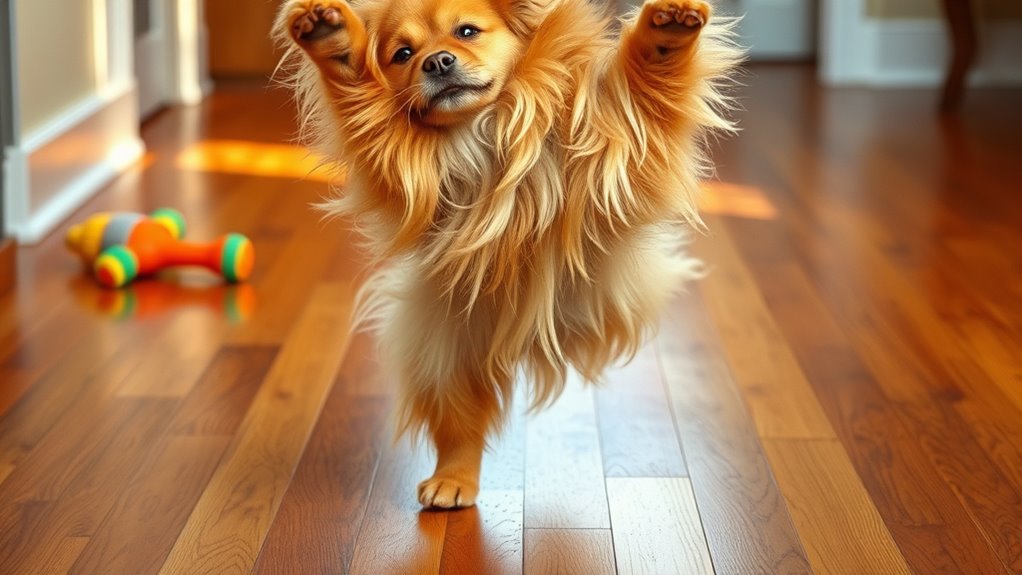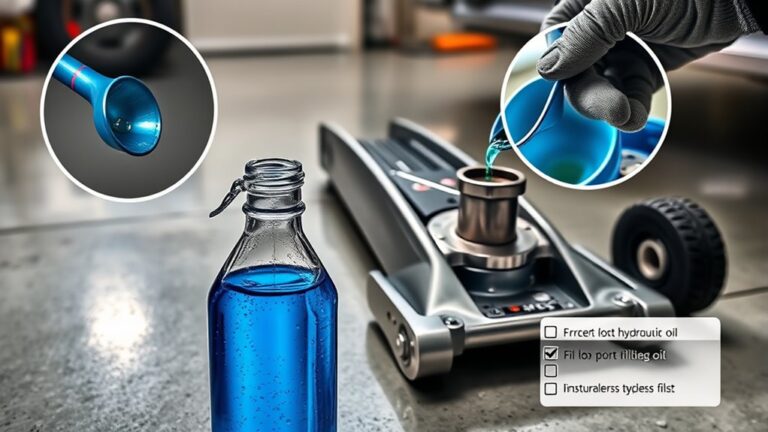When your dog rubs its butt on the floor, it’s often a sign of irritation or discomfort, possibly from full or impacted anal glands, fleas, allergies, or parasites like worms. This behavior helps relieve itching or pressure, but it also signals that your dog needs attention. If it happens frequently, you should check for parasites or skin issues and consider a vet visit to rule out infections or other problems. Keep exploring to better understand what might be causing this behavior.
Common Causes of Butt-Scooting in Dogs

Although it might seem amusing at first, your dog’s butt-scooting is usually a sign that something’s bothering them. Understanding common butt scooting causes helps you address their discomfort effectively and respect their well-being. This behavior often signals irritation or itchiness around the rear end, which could stem from fleas, allergies, or irritation from grooming products. Sometimes, impacted hair or dirt can trigger this reaction, too. Recognizing these triggers is key to freeing your dog from persistent irritation. Your dog’s behavior is their way of communicating discomfort, and by paying attention, you can restore their comfort and freedom to move without pain. Knowing these common causes empowers you to act swiftly, ensuring your dog feels at ease and stays healthy.
How Anal Gland Problems Lead to Scooting
One common cause behind your dog’s scooting behavior is discomfort related to their anal glands. These small sacs near the anus can become full, impacted, or infected, causing irritation that leads to scooting as your dog tries to relieve the pressure and itchiness. Understanding this aspect of dog behavior helps you address their discomfort effectively.
Scooting often signals anal gland discomfort, as dogs try to ease irritation from fullness or infection.
Signs that anal gland problems might be causing scooting include:
- Frequent dragging of the rear on the sol
- Licking or biting around the anus
- Foul odor from the anal area
- Difficulty or pain during bowel movements
If you notice these signs, it’s important to consult a vet. Proper care will restore your dog’s comfort and freedom from this frustrating behavior.
Role of Parasites and Allergies in Butt Rubbing

When your dog frequently rubs their butt on the floor, parasites and allergies could be playing a significant role. Parasite identification is essential because worms or mites can cause intense itching and discomfort. Similarly, allergies—whether food-related or environmental—can lead to irritated skin around the rear. Managing these issues involves careful allergy management and sometimes medication or dietary changes.
| Cause | Symptoms | Solutions |
|---|---|---|
| Parasites | Itching, scooting | Deworming, vet check |
| Food Allergies | Redness, inflammation | Hypoallergenic diet |
| Environmental | Scratching, licking | Allergy meds, avoid triggers |
| Fleas | Biting, hair loss | Flea control products |
| Yeast Infection | Odor, discharge | Antifungal treatments |
When to See a Veterinarian for Butt-Scooting
If your dog’s butt-scooting persists despite addressing parasites, allergies, and other common causes, it’s a sign to consult a veterinarian. Persistent scooting can indicate underlying health concerns that need professional attention. You shouldn’t ignore ongoing discomfort or changes in your dog’s behavior.
Persistent scooting after treatment signals deeper issues—consult your vet to ensure your dog’s comfort and health.
Consider seeing a vet if you notice:
- Frequent or intense butt scooting episodes
- Signs of pain, swelling, or redness around the rear
- Difficulty sitting or defecating
- Changes in appetite or energy levels
Early veterinary intervention helps pinpoint issues like impacted anal glands, infections, or tumors. Addressing these health concerns promptly guarantees your furry friend stays comfortable and free to move without pain. Don’t wait—your dog’s well-being depends on timely care.
Tips to Prevent and Treat Butt-Scooting Behavior

Although butt-scooting can be frustrating to deal with, there are effective steps you can take to prevent and treat this behavior. For butt scooting prevention, keep your dog’s hygiene in check by regularly cleaning their rear area and checking for parasites like fleas or worms. A balanced diet and proper hydration also support digestive health, reducing irritation. If butt-scooting persists, consider treatment options such as expressing the anal glands or using vet-recommended medications for infections or allergies. Always consult your veterinarian to identify the underlying cause and get personalized advice. By taking these proactive measures, you help your dog stay comfortable and free from discomfort—allowing both of you to enjoy a happier, itch-free life together.




